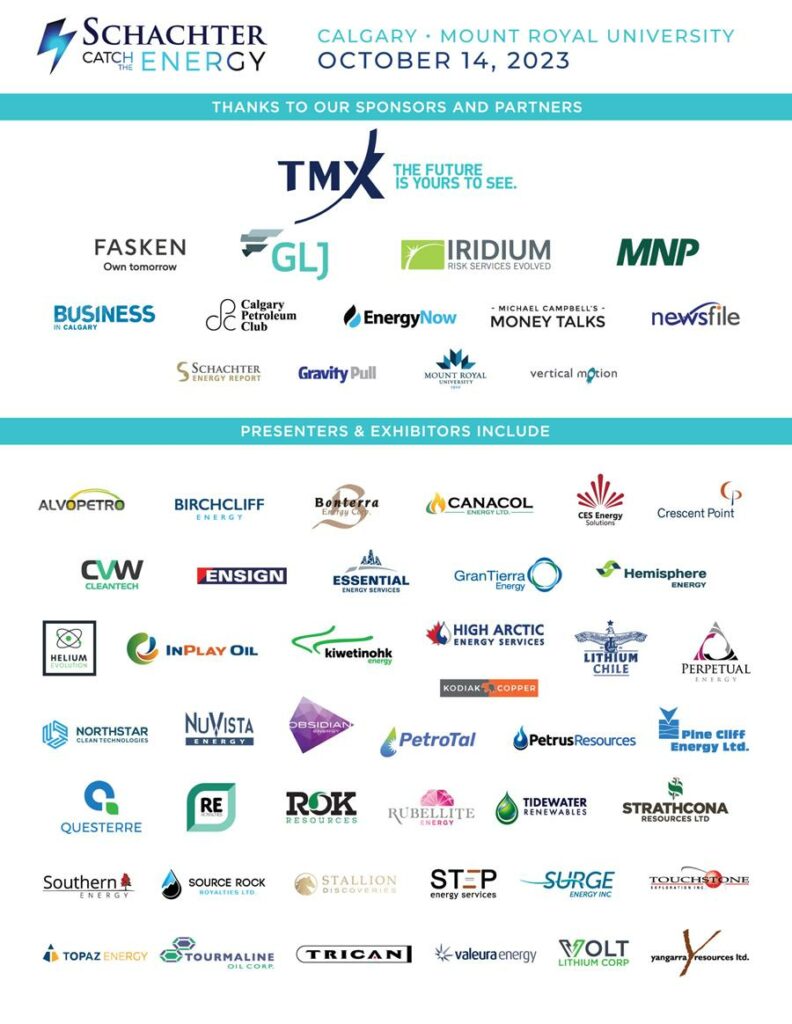
Each week Josef Schachter gives you his insights into global events, price forecasts and the fundamentals of the energy sector. Josef offers a twice monthly Black Gold newsletter covering the general energy market and 35 energy, energy service and pipeline & infrastructure companies with regular quarterly updates. We also hold quarterly webinars and provide Action BUY and SELL Alerts for paid subscribers. Learn more.
The US Stock market is in a material correction with the Dow down over 2,200 points since the early August high of 35,700, now at 33,449. The NASDAQ is down over 1,400 points from its high at 14,447 in mid-July, now at 13,023. Not yet the 10% for an official ‘correction’ but getting very close. Before this downside pressure is over during Q4/23, we expect the key US indices to fall >20%. Caveat Emptor!
Economic, Political & Military Update:
Some of the positive and negative issues facing the US are:
- The stronger economic data (retail sales, durable goods orders) has increased the expectation that the Fed will keep rates ‘higher for longer’. The consensus is for one more Fed Funds rate hike in 2023 and then depending upon the progress on inflation, one in 2024, before the rates are kept flat until the data supports loosening the price of money. Some bank executives like Jamie Dimon of JP MorganChase have floated the worst case scenario of Fed rates rising another 200 BP to 7% to meet the Fed’s inflation target.
- The probability of the US having a government shutdown on October 1st is rising as the intransigent House Republican right wing won’t support any deal that does not include significant spending cuts. The Senate is ready to deal but the House is not. To pass the needed legislation requires action in the next day or so. What I would like to know is do the members of Congress get paid if there is a shutdown? Maybe a bit of personal pain may get them to the table to get a deal.
- The UAW strike is going to impact the US economy and we are already seeing some suppliers shutting down their plants due to parts shortages.
- US Consumer Confidence has fallen for the fourth straight month. The recent sharp rise in gasoline prices will exacerbate this data in the coming months. Gasoline prices in California have risen to over US$7.00/gal in some parts of the state and are up over 50% from lows earlier this year. Fuel prices are a sensitive issue for consumers and likely will impact voter decisions. Not a positive for President Biden.
For the rest of the world no new economic data for this report.
The war in Ukraine is seeing more escalations as one side hits the other. This is now spreading to daily drone attacks on Moscow and Crimea by Ukraine and the Black Sea Ukrainian export ports being blockaded and attacked by Russia.
Some recent events:
- Ukraine attacked the Russian Black Sea naval base and claimed killing 33 Russian officers including the base’s admiral, Viktor Sokolov. Russia says only two people were killed and they showed a video conference where the admiral was seen participating. Ukraine has admitted it is trying to cut off the head of the Russian snake and its leading war officials. They have had some success but so have the Russians in retaliation. This form of warfare will likely expand and start to include the political elite on both sides.
- President Zelensky completed his tour of the US and Canada to keep the munitions and military and economic aid flowing. If the US tapers off this support due to right wing Republican obstinance, then they will not be able to continue their counteroffensive once the rainy season arrives or fund their day to day government expenses. US largesse keeps the Ukrainian economy functioning. Speaker McCarthy did not let Zelensky have the opportunity to address Congress.
- Ukraine is desperate to sell last year’s food crops before the current year is harvested and has been selling cheaply into western European countries now that the Black Sea is a war zone and exports have been stopped by the Russians. Poland, Hungary and Slovakia have embargoed Ukraine grains to protect their own farmers who were seeing grain prices plummet. Some like Poland are also threatening to hold off military supplies. With winter coming, some European countries are tired of the war. Elections to be held should be watched to see if the results show anti-Ukraine politicians winning. This would start the crack in overall support for Ukraine which would be a win for Russia. The one to watch is the Czech Republic where anti-government forces want an end to the pro-western government and an end of support for the war in Ukraine with war funds used to meet domestic challenges.
Market Movement: We have warned about a breach of the 33,600 level for the Dow (today at 33,449), which completes a topping formation for the Dow. A close below 32,600 would set up the waterfall decline phase to below 30,000. Stay patient with cash reserves and be ready to BUY at the next low risk entry point. Investors should consider taking profits in non-taxable accounts due to the sizable move in energy stocks over the last six months. Traders may take a more aggressive approach. We have harvested some of our currently held positions with very nice profits. We are however keeping core weightings in each name. Subscribers please check the SER Ownership releases to see what we have done via our partial harvesting.
Once this correction has lowered stock prices and fear has returned to the markets over the next few months, be ready to buy the bargains that develop. As the general stock market declines we expect energy prices to back off and the Energy Bullish Percent Index to retreat back to below 10% and ring the bell for the next BUY window. The last BUY signal was in March and we added 14 new ideas to our Action BUY List. Many energy stocks are down from their 2022 highs, and many trade around Proved Developed Producing (PDP) Reserve valuations levels. If you want to see what our subscribers are looking at, sign up now for access to the Schachter Energy Research reports at https://bit.ly/2FRrp6k.
Bullish pressure for crude prices comes from the production cuts by Saudi Arabia that have been extended through the end of 2023. This is the dynamic that has lifted crude prices over the last few months, i.e. supply worries. The original Saudi plan was for the 1.0 Mb/d cut to last just the two months of July and August. They then extended the cuts to the end of September and now to the end of 2023. This extension of the Saudi production cut of 1.0 Mb/d squeezed crude short sellers again, and drove the price of WTI up. Since late June (WTI US$67/b) these multiple announcements have lifted crude prices by over US$27/b to US$94/b for WTI today . One other item helping crude prices is that the Panama canal has introduced further restrictions on the maximum number and load levels of daily transits as a drought has impacted the water levels to move ships. The canal handles 5% of world trade.
Some recent bulls have called for US$100/b oil in the coming weeks and we are now seeing some bulls calling for US$150/b in 2024. Commodity and hedge fund speculators are near record long positions as they spike up prices and emphasize the supply cutbacks from Saudi Arabia.
Bearish pressure for crude comes from the weakness in OECD economies in the US, Europe and Japan. China’s recent trade and manufacturing weakness and sluggish consumer spending add to the economic problems in that country. Additional production could come on stream this fall from the weak sisters of OPEC (Iran, Iraq, LIbya, Nigeria and Venezuela). The biggest increase is likely to come from Iraq which is negotiating with the Kurds and the Turkish regime to reopen the northern border pipeline which can move over 450 Kb/d. It has been closed for most of this year due to revenue sharing disagreements. Iran is talking about adding more barrels to reach 3.5 Mb/d by Q4/23. The August OPEC report shows that they raised production to 3.0 Mb/d from 2.86 Mb/d in July. This is the highest production rate for Iran since 2018.
The US$32/b Urals discount is finding lots of buyers and some who don’t care about sanctions are now paying over the sanction limit price of US$60/b to get supplies. Russia keeps on finding new buyers for its discounted crude and products. Russia is also finding new buyers for its grains that it is shipping from east coast ports to Asian customers.
Venezuela is seeing a ramp up of production from new drilling and field work by Chevron. They expect to add 65 Kb/d to their current level of production (135 Kb/d, a 70% increase from 2022) once their current activity is completed. Overall, Chevron expects to add 200 Kb/d by the end of next year since they got the OK from the US and Venezuelan governments.
EIA Weekly Oil Data: The EIA data (data cut-off September 22nd) was moderately bearish for crude prices. Crude Commercial Crude Stocks fell 2.2 Mb to 416.3 Mb. The SPR saw a drawdown of 0.3 Mb to 351.0 Mb after a few weeks of injections. Motor Gasoline inventories rose 1.0 Mb while Distillate Fuels saw an increase of 0.4 Mb/d. Total Stocks (excluding the SPR) fell 1.5 Mb to 1,267.0 MB or 63 days of consumption. Refinery Utilization fell 2.4% to 89.5% as the autumn maintenance season is underway. US crude production stayed steady at the new yearly high of 12.9 Mb/d. Production is up 900 Kb/d above year ago levels, as longer reach horizontal wells are producing more. Cushing inventories fell 0.9 Mb to 22.0 Mb. Motor Gasoline consumption rose by 210 Kb/d to 8.62 Mb/d. Jet Fuel saw a rise of 12 Kb/d to 1.63 Mb/d. Total Demand fell 773 Kb/d to 20.14 Mb/d as Propane demand fell 701 Kb/d to 544 Kb/d. Total US consumption is below last year on a year-to-date basis by 0.5%. Consumption was at 20.17 Mb/d versus 20.27 Mb/d last year. So overall a report not supportive of higher crude prices.
EIA Weekly Natural Gas Data: The EIA data released on September 21st was bullish for natural gas prices as it showed a build of 64 Bcf for the week ending September 15 as electricity demand remains strong given the current heat wave. Storage is now at 3.27 Tcf. The biggest increase was in the Midwest (27 Bcf). This compares to the five-year injection rate of 72 Bcf and the 2022 injection of 103 Bcf. US Storage is now 14.3% above last year’s level of 2.86 Tcf and 5.9% above the five year average of 3.09 Tcf. NYMEX is today priced at US$2.74/mcf.
Our forecast is for NYMEX to rise above US$3.50/mcf in the coming weeks as hurricane season hits the Gulf coast. Tropical storms are forming in the Caribbean and will soon enter the Gulf of Mexico. If they shut down offshore oil and natural gas production then NYMEX could rise to over US$4.50/mcf during winter 2023-2024. Europe should see tightened supplies this winter and if winter is colder than last year should lift prices materially. We recommend buying the very depressed natural gas stocks during periods of general market weakness. We intend to add additional natural gas names to our Action BUY list when we get the next low risk energy BUY signal.
Baker Hughes Rig Data: In the data for the week ending September 22nd the US rig count fell 11 rigs to 630 rigs (up 9 rigs last week). Rig activity is now 18% below the level of 764 in 2022. Of the total rigs working last week, 507 were drilling for oil and this is 16% below last year’s level of 602 rigs working. The natural gas rig count is down 26% from last year’s 160 rigs, now at 118 rigs. The natural gas focused Haynesville now has 39 rigs working down from 71 rigs working last year or down by 45%. Natural gas supplies could fall 2-3 BCF/d by year end due to the lack of drilling and demand should pick up once annual maintenance is completed at key LNG facilities and winter demand ramp up.
In Canada, there was no change in the rig count (eight rig increase last week) to 190 rigs. Canadian activity is down 13% versus last year when 215 rigs were working. Activity for oil is down 22% to 115 rigs compared to 148 last year. Activity for natural gas is at 75 rigs up from 67 last year. The main focus on natural gas drilling has been on the liquids rich condensate Montney and Duvernay plays.

Catch the Energy Conference Update: Tickets are on sale to the public. Become a subscriber and get two free tickets to the conference (tickets to the public are on sale at $179 each currently so the above deal is a very attractive one for attendees and those interested in trying out our research). To find out more go to www.catchtheenergyconference.com. We did sell out last year so if you would like to attend please get your tickets as soon as possible.
Our Premier, Danielle Smith will open the conference. This plenary session will take place in the Bella Concert Hall starting at 8:30AM. Registration is in the Roderick Mah Centre of Continuous Learning Conference Center and starts at 7:30AM. Breakfast will be served in front of the Bella Hall at 8:00AM.
Thank you to our Sponsors, Exhibitors and Presenters. It is going to be a great lineup this year!
We are working to fill the last slots for the conference. Recent companies signed up to the Presenter/Exhibitor line-up include: Freehold Royalties Ltd. (FRU-T), Hammerhead Energy Inc. (HHRS-T) and LithiumBank (LBNK-V). We have a few slots left to fill and will update you each week with the new additions.

Energy Stock Market: The S&P/TSX Energy Index today is at 271, up eight points from last week on the jump in crude prices. As the general market decline unfolds and the Dow Jones Industrials breach 30,000, we expect the S&P/TSX Energy Index to fall below 220. This would trigger another key BUY signal for us. Get your BUY List ready!
New BUY ideas will be issued as energy stocks fall into our BUY ranges. Decide what you want your energy weighting to be for this long energy super cycle. Our Coverage List includes ideas from the Pipeline & Infrastructure area, Canadian oil and natural gas ideas, energy service ideas and companies working internationally. Our list includes large Conservative ideas and small to large caps in our Growth and Entrepreneurial categories. Add to your current ideas or add new ideas when we send out the next low risk entry point recommendations. We expect that WTI should lift above US$90/b during winter 2023-2024 as winter demand recovers and demand should clearly exceed supplies.
CONCLUSION:
We see the March crude price decline to US$64/b as being the low for 2023. However, we may test levels below US$80/b over the coming weeks as we enter the lower demand period of Fall. Our long term optimism on the sector is due to our view that in 2H/24 WTI will exceed US$100/b as demand rises and exceeds supplies. Before the end of this decade we expect WTI prices will exceed the high in 2008 of US$147.27/b. Near term we expect to see a backoff in prices as the general stock market correction impacts most areas and energy, a high beta area, is normally one that corrects during market declines. The S&P Energy Sector Bullish Percent Index has lifted to a 2023 high of 96%, a warning signal of too much euphoria by energy stock investors. It is prudent now to have decent cash reserves for the next low risk entry point. Usually each year you get two to three buy windows. We expect one more during Q4/23 after the two we saw during March. Consider harvesting some gains and building cash reserves. The Bullish Percent is now at 83%.
WTI is priced today at US$93.93/b up nearly US$/b from last week. As the stock market retreat continues we should see WTI crude get dragged down, falling below US$80/b this fall. Even lower levels are possible if China’s difficulties get a higher profile. As markets retreat we expect to take advantage of the bargains in energy stock prices. More BUY ideas will be added to our Action BUY List when we get the next low risk BUY window. Down market days during that time are the best days to build your positions for the lengthy energy super cycle we see lasting into the end of the decade.
Our next SER Monthly Report comes out tomorrow Thursday September 28th. If interested in our upcoming report please become a subscriber. Go to https://bit.ly/2FRrp6k.
Our 2023 ‘Catch The Energy’ has its Presenter line-up almost complete. We expect to have 45 Presenters (10 Presenters from the TMX on Clean Tech and important renewable materials, up from five in 2022). We have taken more space this year and have expanded our booth rooms so attendees can spend more time with the Presenter companies and their senior executives. We have increased MRU capacity to 750+ attendees due to the oversold condition last year. Tickets are available for $179 each at www.catchtheenergyconference.com until all are taken down before the conference. We recommend one buy a quarterly subscription to become familiar with our work and get two complimentary tickets to the event (a very attractive financial offer).
Please feel free to forward our weekly ‘Eye on Energy’ to friends and colleagues. We always welcome new subscribers to our complimentary energy overview newsletter.
Share This:
Next Article




